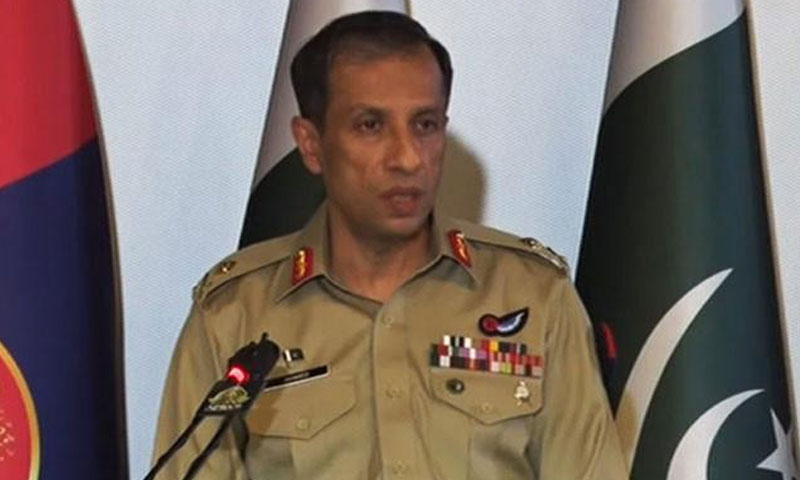Until now, intellectuals had identified only three types of lies:
- Lies
- White Lies
- Statistics
However, the current Director General of Inter-Services Public Relations (DG ISPR), Lieutenant General Ahmed Sharif Chaudhry, has proudly invented a fourth type of lie. Thus, the categories of lies have now expanded from three to four:
- Lies
- White Lies
- Statistics
- Military Lies
There is a common belief that our military lacks creativity; if they had it, the state of the country wouldn’t be so dire. But this is a misconception. The current DG ISPR, Ahmed Sharif Chaudhry, has, in one go, created the biggest lie of the 21st century. The details of it are simply this: One day before Defense Day, in a press conference resembling a politician’s, General Ahmed Sharif Chaudhry declared that the Pakistan Army is neither against any political party nor in favor of any. He further stated that the army has no political agenda.
The common belief is that the most organized political party in Pakistan is Jamaat-e-Islami, but in truth, the most organized political party is the army itself, and it has had a political agenda since 1954. The details of this political agenda are startling and alarming. In the U.S., it is customary to declassify secret documents after 25 to 30 years. A few years ago, some of these classified documents were released, revealing that General Ayub had been in contact with the U.S. since 1954 with a political agenda. He wrote letters to U.S. officials, emphasizing that Pakistan’s politicians were incompetent and would ruin the country, and that the army would never let that happen. At the time, General Ayub was the country’s army chief, and his sole responsibility was national defense. However, there was a politician within General Ayub who dreamt of seizing political power. Had this not been the case, he would have focused on his job instead of writing secret letters to the Americans, trying to sway them against Pakistan’s politicians. Pakistan was created by politicians, not by any generals or military forces. Hence, the rightful heirs to Pakistan’s political sovereignty were the politicians.
If General Ayub was so passionate about politics, he should have resigned from the military and joined a political party, or formed one himself. Instead, he chose to create a political agenda while serving as the army chief. Not only did he write secret letters to the U.S. under this agenda, but in 1958, he also imposed martial law on the country, seizing political power. Under his political agenda, he declared all political parties illegal and imposed harsh laws on the press, stifling freedom of expression. When the presidential elections were held, Fatima Jinnah, the sister of Quaid-e-Azam and the mother of the nation, emerged as General Ayub’s rival. Fatima Jinnah was the rightful heir of Pakistan; her brother had created the country. She was a thousand times better for Pakistan than General Ayub. But under his political agenda, General Ayub maligned her character. Half-page advertisements were published in national newspapers, baselessly accusing Fatima Jinnah of being an Indian agent.
After General Ayub, General Yahya came onto the scene. Under his political agenda, General Yahya held elections in 1970. Brigadier A.R. Siddiqui, DG ISPR during General Yahya’s era, revealed in an interview with Geo News a few years ago that Maulana Bhashani’s Jukto Front was quite popular in the rural areas of East Pakistan. So, under his political agenda, General Yahya gave Maulana Bhashani 20 million rupees to contest against Sheikh Mujib’s Awami League in the rural areas. However, as Brigadier Siddiqui explained, this plan ultimately failed as Maulana Bhashani’s party did not contest the elections against the Awami League. When asked why the agreement between the army and Maulana Bhashani wasn’t implemented, Brigadier Siddiqui responded that it was because General Yahya had already decided to break up Pakistan. Thus, the military defeat by India in 1971 was not the main cause of Pakistan’s breakup; the real cause was General Yahya Khan’s political agenda.
General Zia-ul-Haq also seized power under a political agenda and executed Bhutto. Professor Ghafoor, a prominent leader of Jamaat-e-Islami, once told us that an agreement had been reached between Bhutto and the Pakistan National Alliance (PNA). Bhutto had agreed to hold re-elections for more than 30 seats in the National Assembly, but General Zia-ul-Haq intervened. Bhutto had a fascist mindset, but the crime for which he was sentenced to death was one he did not commit. However, the issue was General Zia’s political agenda. As long as Bhutto was alive, he would remain a threat to Zia. Thus, as a political move, General Zia-ul-Haq had Bhutto executed. It was also under General Zia’s political agenda that Altaf Hussain and the MQM were turned into a powerful force. Zia was wary of Jamaat-e-Islami in Karachi and wanted to sideline it. At the same time, he wanted to keep the PPP in rural Sindh under pressure with the sword of the MQM. Hence, he handed over the entire urban Sindh to Altaf Hussain.
General Pervez Musharraf’s rise was also driven by a political agenda. Nawaz Sharif was the prime minister and had the authority to dismiss the army chief, but General Musharraf refused to accept his dismissal, ousting Nawaz Sharif and seizing power. However, at one point, Musharraf came under pressure from the U.S. and Saudi Arabia and, under a political agenda, allowed Nawaz Sharif to leave for Saudi Arabia with his family. It’s also no secret that General Musharraf, under a political agenda, had Nawab Akbar Bugti and Benazir Bhutto killed.
Generals despise political parties and, under political agendas, have repeatedly declared them illegal. Yet, when it suited their political interests and agenda, they created their own political parties. General Ayub founded the Convention League, General Zia created the Junejo League, and General Musharraf formed the PML-Q. Generals have also crafted new politicians under political agendas. General Ayub made Bhutto what he was, General Yahya shaped Sheikh Mujib, General Zia turned Altaf Hussain into a kingmaker, and General Zia and General Jilani made Nawaz Sharif who he is today. Even Imran Khan is not “self-made” in politics; he was crafted by the generals.
It is also part of history that when the generals are not in power, political governments still follow their agenda. When Benazir Bhutto first came to power, she was informed that foreign and internal policies would remain in General Mirza Aslam Beg’s hands. While in power, Imran Khan danced to the tune of General Bajwa. Today, Shahbaz Sharif’s government is being run under the influence of General Asim Munir.
General Ahmed Sharif Chaudhry’s statement that the army is neither against any political party nor in favor of any is also one of the biggest lies of the 21st century. The army has always been either against or in favor of one party or another. General Zia-ul-Haq was against the PPP and in favor of the Junejo League. General Musharraf opposed the PML-N and supported other parties. General Asim Munir and the entire army under his influence are currently against the PTI and in favor of the PML-N and PPP.
Dear TNT Reader,
At The News Tribe, our mission is to bring you free, independent, and unbiased news and content that keeps you informed and empowered. We are committed to upholding the highest standards of journalism, as we understand that we are a platform for truth.
Apart from independent global news coverage, we also commit our unique focus on the Muslim world. In an age marked by the troubling rise of Islamophobia and widespread misrepresentation of Muslims in Western media, we strive to provide accurate and fair coverage.
But to continue doing so, we need your support. Even a small donation of 1$ can make a big difference. Your contribution will help us maintain the quality of our news and counteract the negative narratives that are so prevalent.
Please consider donating today to ensure we can keep delivering the news that matters. Together, we can make a positive impact on the world, and work towards a more inclusive, informed global society.
Donate Monthly Subscription Annual Subscription





